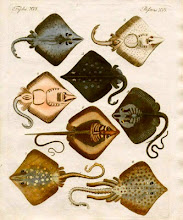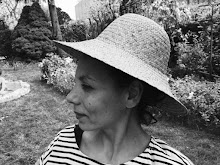WEST
The hair I pull, out of my comb,
drifts off, from the rail of the porch.
It is curled on itself, it folds, kneels,
bows and buckles over onto our earth.
This is the soil I came from, sour
tang of resin and baked dust.
I saw my father's ashes down
into the dirt, except for the portion I
put on my tongue like the Host and swallowed and ate.
I have always wanted to cross over
into the other person, draw the
other person over into me. Fast are the naked palms to the breasts
from behind, at the porch rail, fast
is a look. Slow is the knowing where I come from,
who I might be, like a dream of matter
looking for spirit. Now the hair
rises on an updraft, wobbling, reddish,
in a half-circle, it wavers higher--
the jelly head of the follicle has the tail of the hair in its mouth, it rolls back
up, toward me, through the morning, as if
someone, somewhere, were saying, to me, we are one now.
HIGH SCHOOL SENIOR
For seventeen years, her breath in the house
at night, puff, puff, like summer
cumulus above her bed,
and her scalp smelling of apricots
--this being who had formed within me,
squatted like a bright tree-frog in the dark,
like an eohippus she had come out of history
slowly, through me, into the daylight,
I had the daily sight of her,
like food or air she was there, like a mother.
I say "college," but I feel as if I cannot tell
the difference between her leaving for college
and our parting forever--I try to see
this house without her, without her pure
depth of feeling, without her creek-brown
hair, her daedal hands with their tapered
fingers, her pupils dark as the mourning cloak's
wing, but I can't. Seventeen years
ago, in this room, she moved inside me,
I looked at the river, I could not imagine
my life with her. I gazed across the street,
and saw, in the icy winter sun,
a column of steam rush up away from the earth.
There are creatures whose children float away
at birth, and those who throat-feed their young
for weeks and never see them again. My daughter
is free and she is in me--no, my love
of her is in me, moving in my heart,
changing chambers, like something poured
from hand to hand, to be weighed and then reweighed.
1954
Then dirt scared me, because of the dirt
he had put on her face. And her training bra
scared me—the newspapers, morning and evening,
kept saying it, training bra,
as if the cups of it had been calling
the breasts up—he buried her in it,
perhaps he had never bothered to take it
off. They found her underpants
in a garbage can. And I feared the word
eczema, like my acne and like
the X in the paper which marked her body,
as if he had killed her for not being flawless.
I feared his name, Burton Abbott,
the first name that was a last name,
as if he were not someone specific.
It was nothing one could learn from his face.
His face was dull and ordinary,
it took away what I’d thought I could count on
about evil. He looked thin and lonely,
it was horrifying, he looked almost humble.
I felt awe that dirt was so impersonal,
and pity for the training bra,
pity and terror of eczema.
And I could not sit on my mother’s electric
blanket anymore, I began to have a
fear of electricity—
the good people, the parents, were going to
fry him to death. This was what
his parents had been telling us:
Burton Abbott, Burton Abbott,
death to the person, death to the home planet.
The worst thing was to think of her,
of what it had been to be her, alive,
to be walked, alive, into that cabin,
to look into those eyes, and see the human
Subscribe to:
Post Comments (Atom)




No comments:
Post a Comment